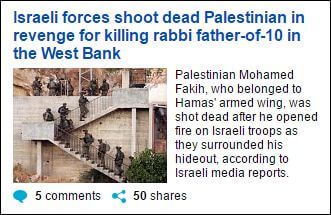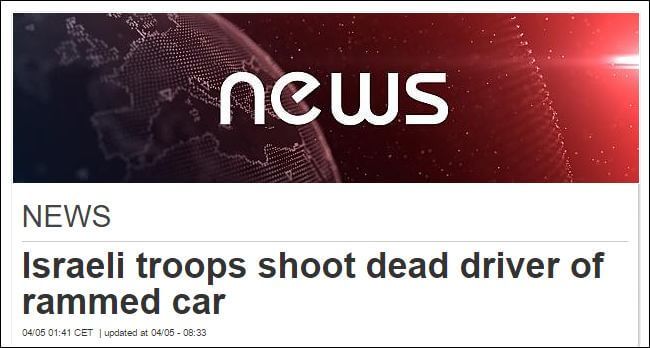The Dishonest Reporting Award typically goes to a clear-cut winner. Last year, the BBC won for a steady output of problematic coverage throughout the year. In 2014, the award went to Gaza war correspondents for their problematic handling of Operation Protective Edge. But 2016 didn’t have any comparable singular outrages like, say, journalist Donald Bostrom’s Swedish blood libel of 2009.
Since a wave of Palestinian stabbing, car-ramming and shooting attacks began in 2015, 36 Israelis, two Americans and an Eritrean national have been killed. According to AFP‘s count in mid-December, 238 Palestinians, a Jordanian and a Sudanese migrant were also killed — mostly while carrying out the attacks, in clashes with the IDF in the West Bank or along the Gaza border, or in Israeli airstrikes on Gaza. HonestReporting readers objected to the slow and steady drip of headlines which, at times, mangled facts, lacked context, used loaded language or — in some cases — were poorly revised after being published.
 Headlines don’t just skew our sense of the world as we scroll through our social media feeds. They also impact the way we read and remember content. We elaborate on this issue, in Why Headlines Matter.
Headlines don’t just skew our sense of the world as we scroll through our social media feeds. They also impact the way we read and remember content. We elaborate on this issue, in Why Headlines Matter.
We took some of the worst headlines of 2016 and broke them down to four categories. The first three are associated with The Eight Categories of Media Bias. The fourth reflects that sometimes, a revised headline can actually be worse.
 1. Distorting the truth
1. Distorting the truth
2. Lack of context
3. Loaded language
4. Regressive revisions
Here’s what we found from a range of papers in the US, Europe, Canada, Australia, and international wire services.
DISTORTING THE TRUTH
One of the seven categories of media bias is distorting the truth — simply getting the facts wrong. Headlines, like their accompanying reports, have to be accurate.
• Mohamed Fakih, a Hamas member, was killed in a July firefight with IDF forces who had come to arrest him for murdering Rabbi Michael “Miki” Mark earlier in the year. Although the BBC‘s coverage made clear that Fakih was killed in a shootout that he instigated (and involved other members of his Hamas cell), the BBC’s headline suggested Fakih was a victim.

Even worse was the Daily Mail, whose original headline called Fakih’s death a “revenge” killing.

• Following the June 8 Sarona market massacre, a headline in The Independent labeled Tel Aviv as Israel’s “capital.” The paper changed the headline in response to tweets from HonestReporting.

• Sometimes, the headline fails — like this one from EuroNews — are simply bizarre and grammatically macabre.

• A CNN headline inexplicably called an April bus bombing in Jerusalem a “bus fire” even though the network had already tweeted police confirmation of terror.

LACK OF CONTEXT
Another category of bias is lack of context, withholding a frame of reference from readers.
• Regarding the above-mentioned Sarona attack, this vivid Sydney Morning Herald headline seems more about click-bait than being informative.

• Another headline typifying this phenomenon was written by CBS News, and oh were HonestReporting readers riled by it.

• When a 13-year-old Palestinian girl, Ruqayya Abu Eid, was shot and killed while trying to stab an Israeli, the New York Times and The Australian peddled zero-context headlines. Lost in the headlines was that she had been in a family fight and left her house “with the intention to die.” (The Times later updated its headline.)


• One of the more memorably bungled headlines came from Down Under in March. It started when two Palestinians rammed their car into a hitchhiking stop in Kiryat Arba, near Hebron, then emerged from the car with guns blazing. Responding soldiers killed the two Palestinians, but minutes later, another Palestinian who tried to run over soldiers in the same location was also shot and killed.
A Reuters headline made sure to mention the Palestinians were killed in the middle of an attack, but Australia’s ABC News, which republished the wire report, changed the headline. You’d have to read the article to find out the Palestinians were killed while attacking Israelis.

• In a 24 hour period in January, a Palestinian stabbed Dafna Meir — a 38-year-old mother of six — to death in her own home, and another Palestinian stabber injured a pregnant Michal Froman. A New York Times headline drew a moral equivalence between Israeli security measures and Palestinian attacks on mothers (?!)

As we noted at the time:
What exactly were these “exchanges of violence?”
Was it an exchange of violence when Dafna Meir bravely fought off her attacker to protect her children? Or perhaps when Israeli security forces neutralized the Palestinian who stabbed Michal Froman?
• During Vice President Joe Biden’s visit to Jaffa in March, a Palestinian went on a 20-minute stabbing spree along a seaside promenade, killing US graduate student Taylor Force and injuring 12 others. According to the International Business Times, Israel simply shoots Palestinians.

• On a February day when five Palestinians shooting and stabbing Israelis in three separate incidents were shot by responding security forces, The Guardian and Irish Times both cranked out context-free headlines.


LOADED LANGUAGE
Another of the seven categories of bias is misleading terminology — prejudicing readers through language.
• For many newspapers, the word terror is a sticky style problem. Absent clear guidelines or the gumption to call terror by its name, headline writers can resort to verbal gymnastics to either avoid the word, or make it clear that the word is attributed to someone else.
A case in point of this was the National Post following the shocking June murder of 13-year-old Hallel Yaffe Ariel, stabbed to death in her bedroom by a Palestinian. If it’s treated as terror, it’s only because Israel labeled it as such.
But if stabbing a 13-year-old girl to death in her own bedroom isn’t terror, what is?

In the face of complaints from HonestReporting readers, the National Post amended the headline.
REGRESSING REVISIONS
It’s perfectly appropriate for news sites to revise headlines as more info about breaking developments become available. And while we appreciate the editors who were responsive enough to our concerns, there were — unfortunately — examples of revisions that made an even bigger mess.
• Following an October, 9 drive by shooting in Jerusalem, in which 60-year-old Levanah Malichi and Police First Sgt. Yosef Kirme were killed and six others injured, the Times of London muddied the waters by updating a perfectly reasonable headline. The Times eventually reverted back to the original headline.


* * *
If all that casual news readers know about Israel comes from headlines like these, what conclusions would they draw about the Jewish state?
What kind of headlines can we expect to see in 2017? We can only wait and watch.
Featured image: Vectors by Vecteezy.com
Before you comment on this article, please remind yourself of our Comments Policy. Any comments deemed to be in breach of the policy will be removed at the editor’s discretion.

